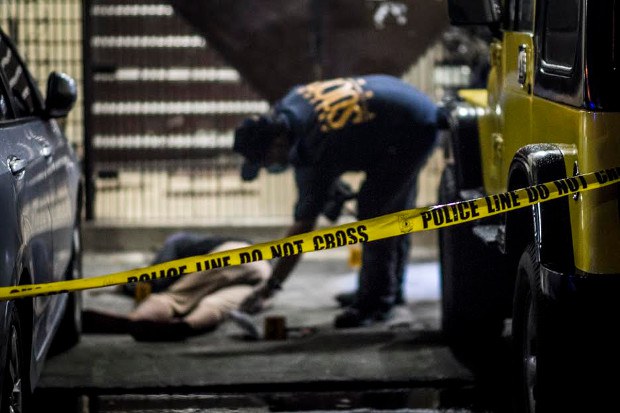Philippines: Gunmen Kill Drug Prosecutor
2019.01.18
Davao, Philippines
 A police crime scene technician inspects the body of a suspected drug user who was killed in an alleged shootout with officers, near Manila’s university belt, Sept. 30, 2016.
A police crime scene technician inspects the body of a suspected drug user who was killed in an alleged shootout with officers, near Manila’s university belt, Sept. 30, 2016.
Unidentified gunmen in the central Philippines shot and killed a prosecutor who had handled drug cases, police said Friday.
Mary Ann Castro, a 49-year-old lawyer assigned to the city of Masbate, was driving her car when she was attacked late Thursday in nearby Cebu city, according to police investigator Edward Sanches. She was wounded in the neck and died while being taken to hospital, he said.
“One of the motives we are looking could be drug related since she has been prosecuting drug cases,” Sanches said.
Castro was the 35th lawyer slain in the Philippines since President Rodrigo Duterte, who came to power in mid-2016, vowed to clean up corruption and wipe out illegal drugs.
He made true on his promise and deployed police for the drugs war. To date, by an official count, it has left more than 5,000 suspected addicts and pushers dead. Rights groups, however, said the death toll from the crackdown could be as high as 20,000, with many cases going unreported.
In November, attorney Benjamin Ramos, a human rights lawyer, had finished paperwork for a client when gunmen on a motorcycle fatally shot him three times in central Negros Occidental province.
Duterte had earlier told the national police not to be cowed by rights lawyers investigating alleged abuses.
He has often flashed a thick list containing the names of judges, lawyers, local politicians and military and police personnel with alleged links to the drug trade. The president has never made public how he came up with the list, but several mayors whose names appeared on it have been killed.
NGO: Philippines ‘a war zone in disguise’
Meanwhile, the Armed Conflict Location and Event Center Data Project (ACLED), an international NGO that gathers data on violence in the region, said in its year in review report for 2018 that the Philippines was among countries considered as a “top flashpoint.”
The group said it recorded approximately 1,000 more events of “close-proximity attacks” on civilians in 2018 than in 2017.
“Overall, civilians faced significant threats from conventional wars (Syria, Afghanistan, and Yemen), but also from government repression (the Philippines) and militia targeting (Nigeria and India),” the report said. “Remote violence targeting civilians declined largely due to a significant drop in the Middle East, even as it increased in other regions and in specific countries, including Yemen and Mali.
It described the Philippines as “a war zone in disguise.”
“More civilians were killed in the Philippines in 2018 than in Iraq, Somalia, or the Democratic Republic of Congo – highlighting the lethality of President Rodrigo Duterte’s ‘War on Drugs’ – cum-state terror campaign,” ACLED said.
“Throughout the year, the Philippines saw similar levels of civilian fatalities stemming from direct civilian targeting as Afghanistan,” it added.
But Salvador Panelo, President Duterte’s spokesman, sought to discredit the group, saying its report was “remarkable in ignorance and bias.”
“We do not need lectures from inexpert foreign groups on how to run a nation,” Panelo said on Friday. “Describing the war on drugs as a state terror campaign targeting innocent civilians as a government policy is pure hogwash. So is putting the Philippines in its list of the most dangerous places for civilians in 2018.”
He said the drug war was governed by “strict protocols” that subject police to accountability for errant law enforcers. He said it was true that the country was a dangerous country, but only for drug traffickers, terrorists and corrupt and abusive personalities.
Panelo also blamed the critical press such as Manila-based online news outlets Rappler’s and the Philippine Daily Inquirer, along with the New York Times and Reuters for allegedly influencing ACLED’s conclusion. He said these groups, along with the New York-based Human Rights Watch were “hopelessly and blindly critical of the Duterte administration.”
ACLED in its website, said it receives financial support from the US Department of State, and International Organization of Migration and U.K. Department for International Development.
Nonoy Espina contributed to this report from Bacolod, central Philippines.







